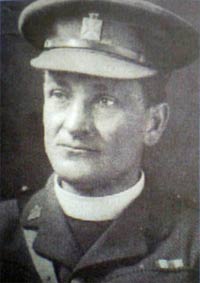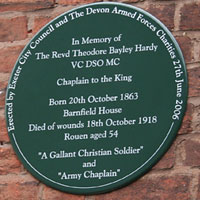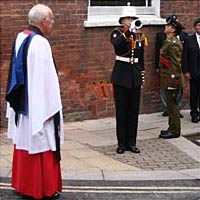
Revd. Theodore Bayley Hardy, VC, MC, DSO
Page updated 18 February 2009
Return to Exeter People Menu
Every city has a son, who achieves the remarkable, and then is swiftly forgotten. One such Exonian is the Revd. T B Hardy VC, DSO, MC., a man who should be remembered by the city of his birth as a true hero.
Born in 1863 in Barnfield House, on the corner of Southernhay and Barnfield Road, he was the son of George and Sarah Richardson Hardy. His father, who was a commercial traveller, died when he was three, so his resourceful mother opened a preparatory school in the city to support herself and her two sons and daughter. He attended his mothers school, until the age of 10, when he was sent as a boarder, to the City of London School. Theodore Hardy then went to the London University - it was while at university, at the age of 24, that he married Florence Elizabeth Hastings. The couple went on to have a son and a daughter.
It wasn't until he was 35, that Hardy was ordained as a deacon in Southwell. In the years up to the First World War, he was a schoolteacher, and a curate in Nottinghamshire. He then became a headmaster at Bentham Grammar School. Ill health meant a move to Hutton Roof in Cumbria as a parish priest, during 1913. His wife died a few weeks before war broke out.
Young men rushed to join up, and march to defend their country. Hardy by this time was over 50, but he felt that he should too serve his country in some way. The authorities felt that the front was no place for a clergyman of his age - in the summer of 1916, after the slaughter of the Somme, they relented, and Theodore Hardy was sent as chaplain to Etables, a base on the channel coast of France. This was not enough for Hardy - he wanted to serve at the front, and to minister to the fighting men, in the mud and gore of the trenches. In December 1916, he persuaded the army to allow him to join the 8th Battalion of the Lincolnshire Regiment, at Vieille Chapelle.
Hardy ministered to the troops during the build up to Passchendaele, dodging the snipers, handing out sweets and cigarettes, writing letters for the troops, and calming many a lost and frightened soul. On the 31st July, the battle commenced with an attack on Riffle Farm. The battalion suffered 7 officers and 170 other ranks, as casualties in this action. All this time, Hardy was with his men, helping the stretcher bearers and bringing succour to the wounded. He was awarded the Distinguished Service Order for his work. He continued at the front, through September and into October and was awarded again, with the Military Cross "For repeatedly going out under heavy fire to help the stretcher bearers during an attack."
The war ebbed and flowed, and in the spring of 1918, the Lincolns were moved to a position on the Somme. Hardy was in the thick of it, as usual, and his actions on the 5th, 25th and 27th of April 1918, resulted in him being awarded the Victoria Cross. On the 27th April, he was the last to leave a wood that the battalion were evacuating; he found a sergeant in a forward position, to accompany him back in to the wood and rescue a wounded man, the whole time under enemy fire. When told that he had been nominated for the VC he said "I really must protest". On the 9th August, George V presented him with his award at Frohen-le-Grand. The King appointed him Chaplain to His Majesty, hoping to remove him from the front. Hardy had none of that, and returned to his battalion. On 10th October 1918, he was hit by machine gun fire, as the Lincolns were crossing the river Selle by night. He died on 18th October 1918, three days before his 55th birthday. Hardy was buried in the cemetery at St Sever, near Rouen. Hardy is the most decorated, non combatant in the First War. On Veterans Day 2006, a plaque was placed on Barnfield House to commemorate the birthplace of this remarkable Exonian, Theodore Bayley Hardy.
I would like to thank Colonel J K Courtenay for suggesting the Revd. T B Hardy for Famous Exonians and for supplying some of his biography.
 The
Rev. T B Hardy in uniform.
The
Rev. T B Hardy in uniform. Plaque at Barnfield House.
Plaque at Barnfield House.
 Ceremony to
unveil the plaque.
Ceremony to
unveil the plaque.
│ Top of Page │